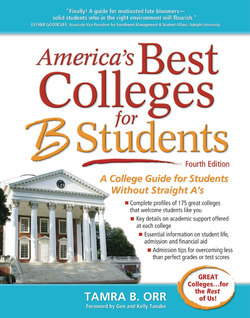Читать книгу America's Best Colleges for B Students - Tamra B. Orr - Страница 9
На сайте Литреса книга снята с продажи.
CHAPTER ONE WHERE TO FIND COLLEGES THAT WELCOME B STUDENTS We Really Do Want You (Or, Why Colleges Love B Students …)
ОглавлениеWhy would a college want you, the B STUDENT, instead of Ms. Straight A’s or Mr. Perfect SAT Score? Easy! Colleges want diversity. They want all kinds of students and that means you too. You are so much more than your GPA or your ACT scores and most colleges realize that. They want you because you are curious, enthusiastic and interesting!
You want the chance to shine, and there are colleges that want to help you do it. Think about it for a moment. There are more than 3,400 four-year, accredited colleges and universities in this country. That’s a lot of places to learn! You can be sure that there are many schools for everyone and there certainly are many choices for B students. Your statistics may make the search a little longer and a bit challenging but no less rewarding.
Nothing is as important to your educational success as finding a college where you feel comfortable. A key to success is being flexible and prepared to give the avenues open to you a fair chance. You have to be willing to look a little deeper and explore options, some of which you may not have thought of before. For instance, “Keep an open mind about going out of state,” encourages Lynda McGee, college counselor at Downtown Magnets High School in Los Angeles. It is McGee’s personal goal to find schools for all students. “Some students fear leaving the area, especially those in sunny California,” she explains.
Judi Robinovitz, an educational consultant for more than 25 years, suggests that students be open to exploring colleges they may not already know about. “You have to dispel the notion that just because you have not heard of a college, it’s a bad college,” she says.
“There are no bad colleges,” explains Patrick O’Brien, former admissions officer and consultant-ambassador for the ACT. “Remember, the ‘best’ school is the one that is best for you, not necessarily the ones that are highlighted in the books,” says O’Brien.
But, why would a college be willing to take a chance on a student who doesn’t have the kind of scores and grades thought to be required by a majority of colleges? It’s simple: They have common sense.
First, a number of universities want a diverse student body roaming around their campuses. To achieve this, they have to broaden their ideas of what kind of student they will accept. Just as colleges accept people from all kinds of financial, ethnic, religious and racial backgrounds, they often will accept those with various levels of academic achievement.
Second, admissions officers often realize that while students may not have the most perfect numbers, they can still add greatly to the student body. They may be tremendous leaders, facilitators, speakers or organizers. They may exhibit strength in a variety of skills that can’t be pinpointed with the average test score. For example, while a student may not perform well in math, he or she may excel in the humanities. These students can enrich the campus community in untold ways.
Last, colleges know that some students are genuinely working toward starting over, to changing their priorities and standards. Often this can be seen in school transcripts. Grades are improving with time; a new leaf has been turned over. Colleges recognize that some students really do go through difficult times such as the severe illness or death of a family member. Because of this, they are frequently willing to overlook some weak numbers and support that new dedication by accepting you into their college and giving you another way to continue your trend.
So the college that you assumed was out of reach because of your grades or test scores may actually be entirely possible if you can give them a reason for why you deserve to be there.
“Community colleges are stepping stones to four-year universities, and they cost less, build skills and develop maturity. Students in the community college system gradually get into the college culture but with the security of home and familiar circumstances.”
— Patrick O’Brien, former admission officer and consultant-ambassador for the ACT
